The making of champions: How Liverpool won the Premier League after hard truths and key changes
When Jurgen Klopp left, Liverpool’s glory days were meant to be numbered. Instead, it looks like Arne Slot’s winning machine is just getting started. The key factors behind their title win.
As Mohamed Salah, Virgil van Dijk and Andrew Robertson were working on set-piece routines, a few yards away Trent Alexander-Arnold was focusing on defending the back post under the watchful eye of the Liverpool assistant coach John Heitinga.
Ibrahima Konate was finessing his passing out from the back and, elsewhere on the pitches at the club’s AXA training headquarters, a number of academy kids had been drafted into a session designed around how an opposing team might line up.
That scene on the eve of Arne Slot’s first competitive game as the Liverpool head coach, against Ipswich Town, back in August in many ways encapsulates what has transpired since. Here was a four-way coaching clinic, borne out of a commitment to improve and stimulate a squad that had just fallen short the previous season.
The lessons have not stopped, providing the foundation for the club’s 20th league title; only their second in 35 years.
For Slot to guide Liverpool back on to their perch in his first season at the tiller after leaving the Dutch side Feyenoord, succeeding Jurgen Klopp, represents a coaching triumph. This is how he did it.
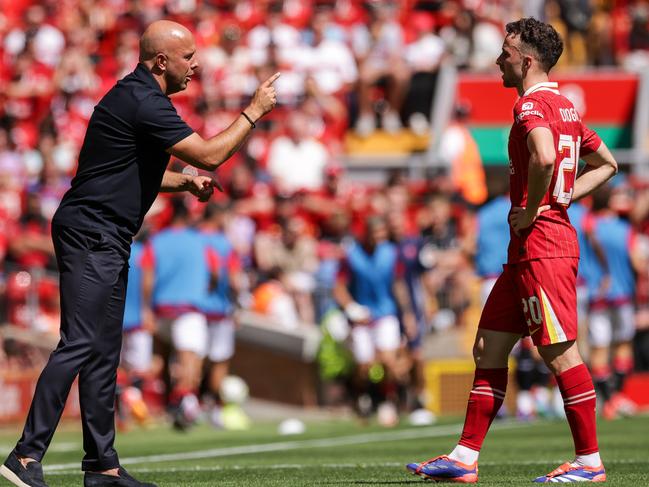
POLITE, OBSESSIVE, HARD AS NAILS – MEET THE NEW MAN
Towards the end of his tenure, Klopp had stated the dressing room would benefit from a new voice after nine years in which his own force of personality had inspired Liverpool to hit the heights.
The implementation of a more controlled, possession-based style (while trying to keep Klopp’s intensity off the ball) had first been evident on the United States tour in late July when Slot’s “kill them with passes” mantra was heard as he put his players through their paces.
Yet pre-season also posed a problem. Due to the European Championship and Copa America, the new head coach was without his captain Van Dijk, Alexander-Arnold, the goalkeeper Alisson and the midfielder Alexis Mac Allister.
Slot overcame this with calls to players. These were far from love-ins, pointing out areas for improvement and laying down challenges. Through those initial interactions, some players saw the game in a different way, for example the positioning of the goalkeeper and the centre back to create 2-v-1s when playing out from the back.
Communication is a strong suit of Slot’s. His parents were both teachers so learning, taking in information and passing it on, comes naturally.
“After the summer, players like Virgil didn’t walk in the building and go, ‘You better win me over,’ ” said one source. “The players walked in and said, ‘We need to show him that we’re at it.’ There’s humility in the group. They want to learn.”
The return last March of Michael Edwards, formerly sporting director but now chief executive of football for Fenway Sports Group, Liverpool’s owner, was pivotal to the new era. There is a deference even among the players to Edwards given his role in laying the foundations for past achievements, a realisation that his super-strength lies in his decision-making.
The appointment of Richard Hughes as sporting director by Edwards immediately gave the Scot an eminence that was supported by his eye-catching work in a similar role at Bournemouth. Hughes’s forensic pursuit of Slot came with the backing of Edwards.
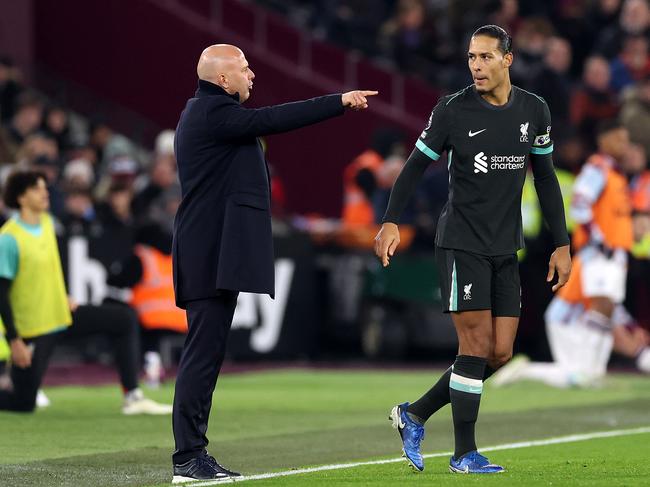
After a 1-0 friendly success over Real Betis in Pittsburgh, the FSG president Mike Gordon visited Slot at the team’s Fairmont Hotel base. They had spoken before on the telephone, but over the course of the weekend spent time in each other’s company.
Gordon was aware, perhaps more than anyone, of the degree to which Liverpool’s resurgence had been tied to Klopp. That made the task of replacing him fraught.
Yet he was struck by how strategic, concise and clear Slot was in his thinking and that he was not a walking-on-eggshells type of guy. Gordon telephoned Hughes and Edwards to relay how impressed he had been.
The first meeting of a fully integrated squad took place in the build-up to the final friendly against Sevilla, six days before the start of the Premier League season, and it set the tone.
Liverpool had beaten Manchester United 3-0 in their final game in the US, but it was pointed out that the players were not sprinting back quickly enough to defend their own box.
Running speeds were highlighted, and the fact that one player on the halfway line had been beaten by a team-mate who had started in the opposition half.
The squad was shown a graph of the number of players each Premier League side had behind the ball when a rival team was in the opponent’s final third. Last season, Liverpool ranked below halfway while, this term, victories have usually coincided with them having the most players tracking back. The games in which they have dropped points have been those when they could have tracked back more. Hard work has paid off.
That message was hammered home in the early weeks of the campaign with Slot showing clips of Manchester City’s Phil Foden and Savinho as examples of the work rate he desired.
There have been a lot more team meetings but also a strong emphasis on individual coaching sessions. His coaches, the assistant Sipke Hulshoff, Aaron Briggs and Heitinga, will take those after training, or as part of training.
They are supplemented by one-on-one feedback.
“That can be brutal,” a source said. “Arne is a serious guy, absolute football obsessive, very polite, very gentle in some regards, but, actually, as f***ing hard as nails when it comes to football.”
It is never to belittle, always designed to improve, and supported by clip after clip after clip.
Tactics boards adorn his office and the Anfield dressing room. Walk past Slot’s office and often he will be stood alone at the board trying out something new.
Every detail counts. There is a story of one first-teamer being asked to be more attentive during passing rondos. Surprised, the player said he already was but Slot explained he needed to be more alert to receive possession. A clip was shown. The player went away in agreement.
Feedback is conducted upstairs at the AXA Training Centre, which has become a football zone. There has been a redesign of the flow of offices and a move away from one big coaches’ room. Hughes, Slot and his staff all occupy rooms next to each other and a meeting hub has been created where individual get-togethers are held.
It is similar to the set-up at Brentford and was brought in to encourage interaction. A new coffee bar, inspired by Edwards’ visit to the Italian club Roma where he was greeted by a friendly barista, has helped foster a sense of camaraderie.
Previously there had not been a single place for the players to all congregate. Now the club regularly post videos of the area with Salah, Kostas Tsimikas and Dominik Szoboszlai usually holding court. Van Dijk is partial to orange juice with a ginger shot and he also asks for a surprise smoothie.
For Slot, there has been limited downtime. He plays padel with staff, watches some Netflix shows and enjoys watching a Dutch comedian called Jochem Myjer but football is never far from his thoughts.
“I often get a meal from the club, eat it at home and watch football on television,” he said. “The life of a manager is not always as exciting as it seems.”
He went to Ibiza during the March international break and admitted he needed the break after an intense period of matches and incessant media demands.
His wife and children have remained in the Netherlands as this season has coincided with school exams. That has been hard for Slot, who has not followed previous Liverpool managers in living near the coast in Formby, Merseyside. He is closer to Manchester airport which helps on the rare occasions he does fly home.
Fundamentally, he is football, football, football.
HOW SALAH SCALED NEW HEIGHTS
Salah had ended 2023-24 a picture of frustration, briefly at odds with Klopp after a touchline spat in a game away to West Ham United, yet returned in the summer with the bit between his teeth.
He hit the ground running in the fitness tests with one source remarking, “Straight away everyone thought, ‘He’s at it. He’s ready.’ ”
Slot’s individual sessions have helped to reinvigorate Salah. Being told where and how he can improve has been refreshing for an elite player.
A desire to prove he was worth a new two-year contract also had a bearing on his displays. He started this season with a goal and an assist against Ipswich. He has not stopped scoring and creating ever since.
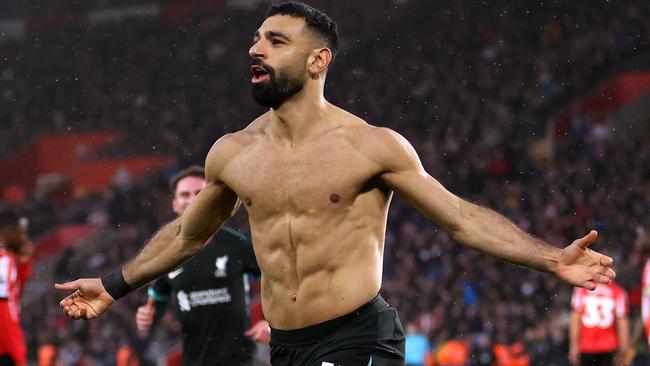
Given the numbers he has posted, it is ironic that team-mates have recognised a shift in Salah’s mindset away from someone obsessed with chasing the Golden Boot.
He has become more team orientated, perhaps not in terms of chasing back but in providing assists. This season has been more profitable than ever for Salah. He has scored 28 goals so far with four games still to play. Eight of these have been match-winning or point-saving goals, accumulating 19 points. He has also assisted 18 times, his best return in the Premier League. With five games remaining Salah needs six goals to break his record of 32 in 2017-2018. He leads by example, standing out in the three “Ps” – preparation, professionalism and performance – but also has a playful side. Described as bubbly and polite at the training ground, he is always willing to pass on advice, and is known to cook meals for his team-mates, with Alexander-Arnold among those to have visited his home.
If Salah’s goals have made him the headline act, then the list of players who have improved is extensive.
Van Dijk was informed on day one that he would be asked to assume more responsibility for building attacks and he has enjoyed broadening his repertoire by playing out from the back and breaking lines with his passing.
Playing Ryan Gravenberch at No 6, where at Bayern Munich and then Liverpool he had been deployed further forward, has helped the midfielder get closer to fulfilling his rich potential.
The failed pounds 51 million move for Real Sociedad’s Martin Zubimendi last summer caused far less angst internally than it did externally.
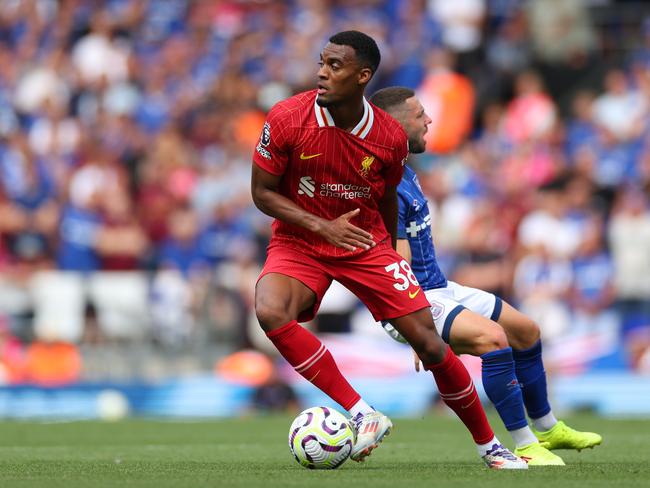
The midfielder agreed to move to Merseyside and then performed a U-turn when his boyhood club applied pressure. Yet Slot was impressed by Gravenberch on the US tour and did not kick up a fuss.
His willingness to ensure the transition from Klopp did not become bigger than it needed to be should be recognised. There were no demands for signings to put his own stamp on the team. He favoured evolution rather than revolution, using this season to see which players he could rely on moving forward. Some have not passed muster, including Darwin Nunez, but the tag of champions speaks to the level of improvement.
HOW TO TRAIN A CHAMPION
During their analysis of potential replacements for Klopp, Liverpool found that Slot ranked high on a variety of metrics. One was a points-above-expectation model, something Brighton & Hove Albion use to appoint their coaches. This showed that each season, Feyenoord won more points than the data predicted.
Another model, player improvement, was developed by Liverpool and assesses performances before, during and after a head coach’s reign. It was noted that Slot “stood out like a sore thumb” in taking players to another level.
Liverpool also looked at the fitness records of their candidates’ squads. Ruben Amorim, then of Sporting Lisbon and now at Manchester United, ranked best but context was required. The intensity of the Portuguese league is lower and Amorim frequently rotated his team.
Slot’s record was good at Feyenoord, but again the demands of the Eredivisie are not comparable with the Premier League.
As Liverpool’s first “head coach” rather than “manager”, Slot knows his job is to pick the best players, play them in the right position, help keep them fit and coach them.
A large element of Liverpool’s success has been the availability of players. Salah, Van Dijk and Gravenberch each started the first 32 matches in the league, the first time since 1987-88 that three outfield players had done so.
That has not happened by chance. The switch from Klopp to Slot offered an opportunity to reappraise working practices and empower some of those in place.
A typical day at the AXA Training Centre can be split into three.
The first is “Assess and Prepare”. Each day, the players fill in a questionnaire on how they are feeling. Blood tests are taken every other day with the results delivered on site within minutes. If players are returning to the club after two days off, they take a dip in the ice bath to “wake themselves up”.
Some will take part in exercises such as yoga and meditation before Slot holds a team meeting.
The second element is “Load and Explode”. Players head to the “Green Room” where the squad congregates before training. Performance sessions take place here that focus on sharpness, agility, balance and mobility.
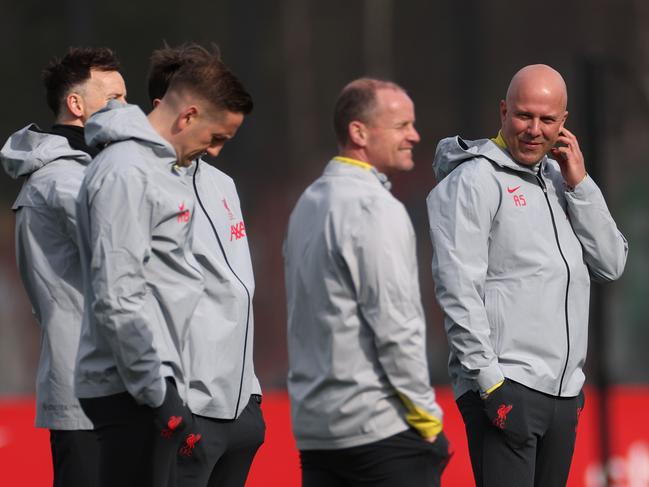
Training is conducted in smaller spaces and is more intense. GPS tracking allows sessions to be tailored so that a player’s output is roughly at 60 per cent, or sometimes 40 per cent, of how they would perform in a match.
The third phase of the day is “Refine and Recover” which takes place between training and lunch.
Every player has a personal programme which includes how long they should spend in the ice bath as part of their recovery. Buy-in from the players has been strong.
Just before the Merseyside derby on April 2, the club’s website posted a picture of Gravenberch using his left forearm to push away the fitness coach, Jack Ade, who was holding a crash bag. It looked like a simple strengthening exercise but there is more to it than meets the eye.
The crossover between science and medicine meant Will Spearman, Liverpool’s director of research, had identified areas in Gravenberch’s game in which he could improve. The dazzling footwork that spirits the Dutchman away from opponents is heaven sent, but the work done has helped with his duel success rate and ball retention.
His performances have validated Spearman’s methodology and the programme that the physical performance team oversaw. That is incredibly satisfying for them but also powerful for Gravenberch, and his team-mates, to see such advances.
Sessions are planned with input from the highly-regarded Dr Conall Murtagh, head of physical performance, and Ruben Peeters, the lead physical performance coach, whom Slot was insistent should follow him from Feyenoord.
There is a collegiate approach which cannot be underplayed.
MISSION ACCOMPLISHED
Old Trafford, September 1. Manchester United 0 Liverpool 3.
There was a symbolism to that victory which was not lost on the players, nor the supporters. Five months earlier, Liverpool had gone to the home of their rivals twice in quick succession in the FA Cup and the Premier League. Despite dominating both matches, they lost and then drew. Poor finishing was partly to blame, but everything felt a little rushed and a game of basketball ensued.
Under Slot, the football has been calmer. The victory over United was, in the words of Cody Gakpo, “confirmation” that Slot’s style would work. “OK, we’re here,” he added.
Only Manchester City have claimed more points from losing positions and a key moment came against Brighton & Hove Albion on November 2.
Trailing 1-0 at half-time after a slipshod 45 minutes, they scored twice in three second-half minutes through Gakpo and Salah on a day when Slot first witnessed the role a raucous Anfield can play in shaping matches.
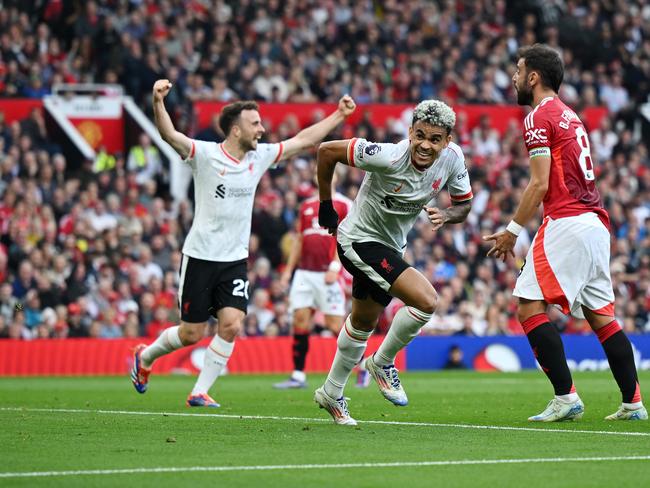
Salah’s decisive strike was a howitzer. The move started when Jones picked up the ball half way inside his own half. He played a one-two with Diaz in the centre circle and then drove forward with the ball into the Brighton half. Jones then found Salah, who was tracking the play and was running through on the right-hand side. Salah cut inside onto his left and fired a shot into the left-hand corner of the goal, sealing a 2-1 win for Liverpool.
Victory took Liverpool to the top of the table and they have peered down at their rivals ever since.
Just before the fightback began in earnest, Slot made two substitutions, bringing on Curtis Jones and Luis Diaz for Szoboszlai and Mac Allister. Jones provided the assist for Salah and the head coach’s in-game changes have been a feature of the season. A seminal few days followed when Real Madrid and Manchester City were each swatted aside 2-0 at Anfield in late November and early December. The club had been scarred by Champions League final defeats by the Spaniards in 2018 and 2022, while twice Liverpool had lost out on the final day of the Premier League season to Pep Guardiola’s side in 2019 and 2022.
The win over City was construed by some in the dressing room as the best they had ever played against them, bolstering a belief among the players that they were now “a serious team”. Slot and his staff had identified four potential areas in which they could profit with low, hard crosses across the face of goal earmarked as one. Gakpo’s opening strike at the far post from Salah’s sumptuous pass was validation.
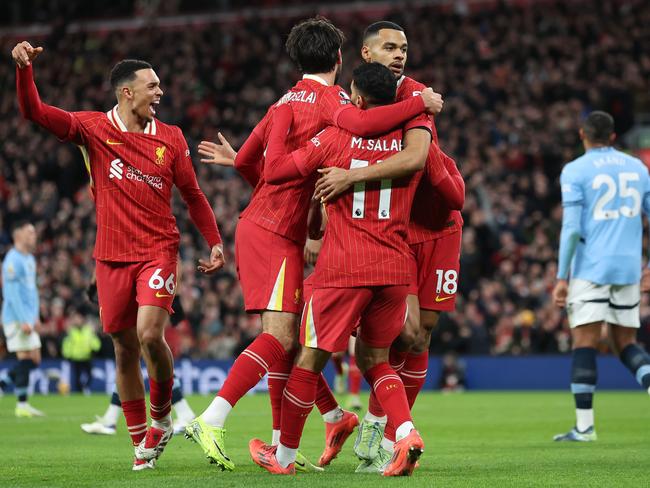
The original target was qualifying for the Champions League. Liverpool exist to win trophies but the lifeblood of the club comes from their seat at Europe’s top table. The club’s self-sustaining model relies on money being brought in to reinvest. Last year’s accounts showed a pounds 57 million loss without Champions League football.
In the corridors of power at Anfield, the prevailing view was that the 2-2 draw with Aston Villa in February essentially assured Champions League football.
It is not in Slot’s nature to take anything for granted, yet he had smashed that soft target out of the park with almost a third of the season remaining. Now there was a title to be won.
JUST THE START?
The coach Hughes got a feel for during their face-to-face discussions in the Dutch city of Zwolle last spring is the coach Liverpool have seen in practice. There have been no surprises. Slot has praised Hughes for creating the environment that has allowed him to focus on what he is best at: coaching improvement from players.
The next step has already been identified. Slot has proved to be incredibly honest throughout the season, highlighting the need for his side to be more ruthless to win “four or five-nil and after half an hour is already three-nil.”
“We are not that team yet,” he said, referencing how they have relied on “fighting spirit”. In only ten of 52 matches in all competitions have they won by a greater margin than two goals and Slot’s father, Arend, told his son that he had been bored by January’s Champions League win over Lille.
There is a sense that Slot could have trusted more members of his squad having effectively got through the season with a core of 13 or 14 players. Only four have started league games in midfield – Gravenberch, Mac Allister, Szoboszlai and Jones – and in the final weeks some have appeared tired.
There will be changes in personnel as they look to build on the success of this campaign, but Liverpool’s strategy, in contrast to some of their rivals, has been quality over quantity in the transfer market. This allows them to then allocate resources to extend the lucrative contracts of players such as Van Dijk and Salah.
Liverpool’s charge to title No 20 has been impressive, yet the pursuit of the next one is already under way.




To join the conversation, please log in. Don't have an account? Register
Join the conversation, you are commenting as Logout